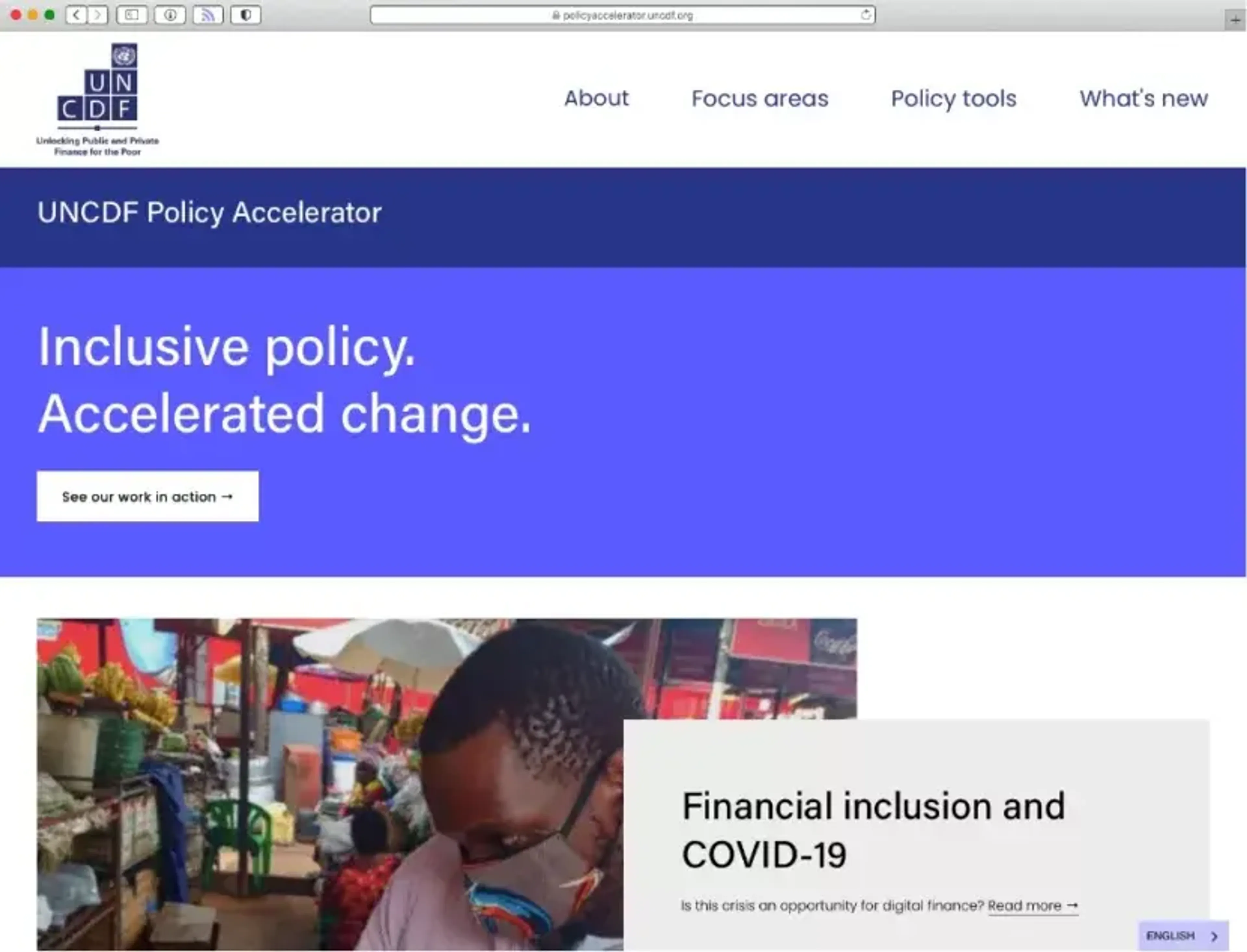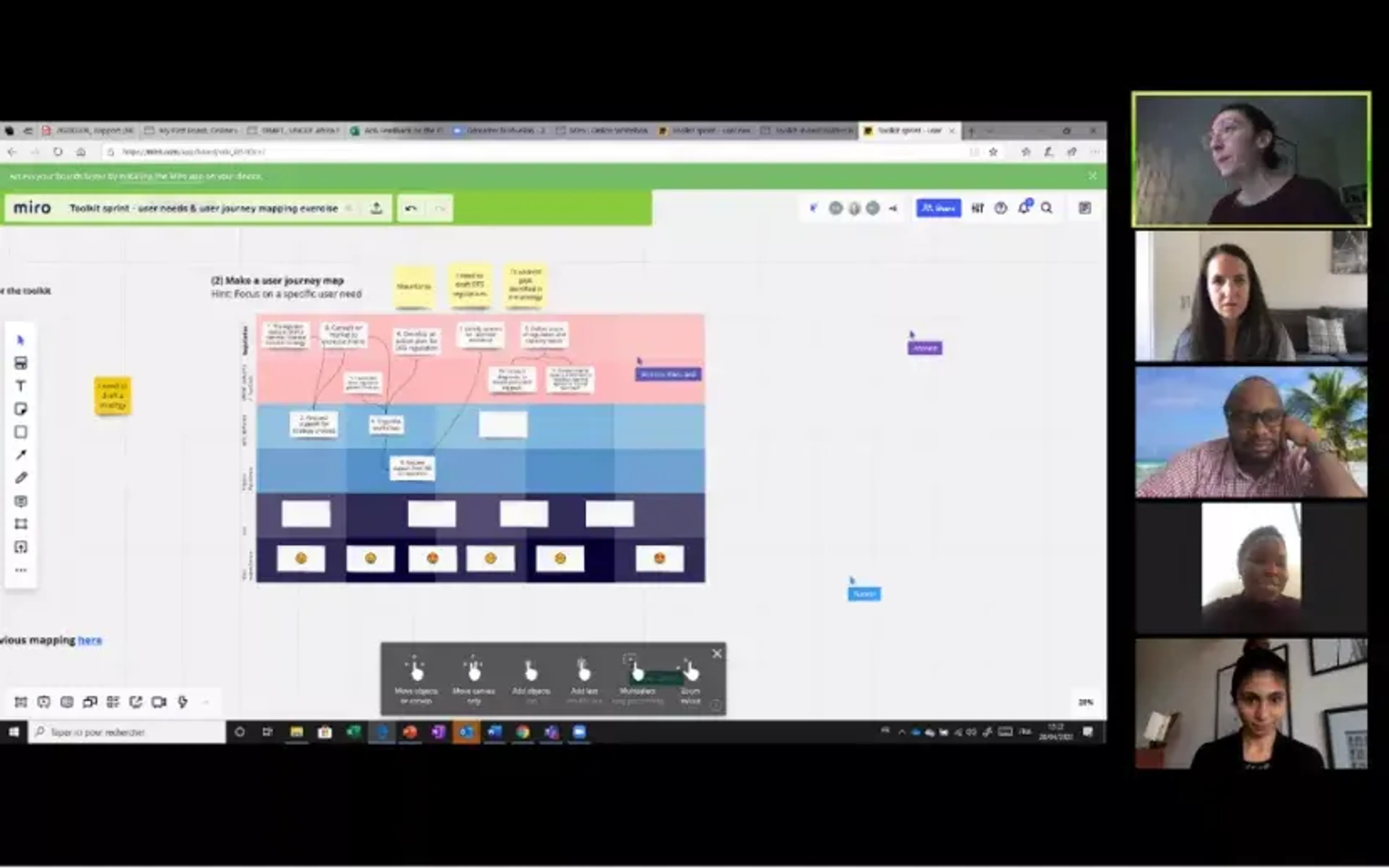Accelerating the accelerators at the United Nations Capital Development Fund
Emily Middleton worked as a Partner at Public Digital from September 2018 until July 2024 and set up Public Digital’s international practice, working with multilateral development banks, UN agencies, and philanthropies.

Not long before the pandemic struck, Public Digital started working with the United Nations Capital Development Fund (UNCDF)’s Policy Accelerator team, a specialist unit that works with financial regulators and policymakers.
The team does inspiring and important work, focusing on 'inclusive economies' – financial markets and services that work for everyone. They support regulators and policymakers to unlock the benefits of digital financial services. They also have a focus on furthering women’s financial inclusion and economic empowerment.
The team is small, spread across multiple timezones (even before coronavirus), and largely made up of former financial regulators and policy experts. They have experience of working in the kinds of organisations that they now seek to help.
Starting in early 2019, with backing from The Bill and Melinda Gates Foundation, they started the new Africa Policy Accelerator programme, providing specialist advice and coaching to policymakers and regulators in 14 markets.
In short, this team are financial inclusion experts doing good work
that could have a positive impact on millions of people’s lives. We
jumped at the chance to work with them.
Global financial policy as a communication problem
Early on in our work with the UNCDF team, we collectively realised that:
- Many regulators and policymakers need practical tools to guide their policy-making and analysis. They want advice, and examples from other countries, but they (typically) are time-pressed and rarely have time to read long PDF reports.
- The UNCDF team need straightforward ways to share emerging thoughts. Team members have diverse perspectives and experience, and wanted to develop their own voices in a way that provided the best possible help to their users, while conveying a consistent image as one team within the UN system.
They were convinced that there was a better way to write and disseminate content that was responsive to the needs of their users, and would help them develop as a team. And given their stakeholders are increasingly interested in the impacts of the digital economy, it was especially important to build their own digital capabilities.
Getting started
Over 4 months, we helped the UNCDF team get started by:
- running training sessions on topics like user research, working in the open, and content design versus agile communication
- writing an agile comms guide for the team, tailored to its UN context, and its skills and ambitions
- exploring the potential to use product roadmaps - focused on outcomes, rather than milestones - to plan some of the team’s work
- providing feedback on draft blog posts and other pieces of writing
- providing tips and techniques for conducting and analysing user research
- advising the team on the skill sets needed for in-house comms specialists
- facilitating a week-long design sprint for the team, to make progress on a specific outcome. This happened just as the pandemic took grip in March, so we quickly pivoted from doing this in person to doing it all online, using tools like Zoom, Miro and Balsamiq

There were strong parallels with our work for EdTech Hub – much of this was about applying agile and user-centred thinking to communication. That doesn’t just mean changing the way you write and the way you publish, it also means thinking about the processes you use to manage pieces of writing, and the rules that govern how an idea becomes a published piece of work.
There were strong parallels with our work for EdTech Hub – much of this was about applying agile and user-centred thinking to communication. That doesn’t just mean changing the way you write and the way you publish, it also means thinking about the processes you use to manage pieces of writing, and the rules that govern how an idea becomes a published piece of work.
More than just a website
More recently, we caught up with the UNCDF team again and they shared the website they’ve been busy constructing, based on advice we gave them earlier in the year.
We were so impressed – the new site was so much clearer, simpler and more accessible than many of the alternatives.
It gives the team a much more usable and useful platform for ongoing communication with the people who need their advice the most.
But – and again, just like EdTech Hub – this project wasn’t just about the website. It was about taking the time to understand what users need. Policy is a world that expects long, detailed documents, but in our view those documents shouldn’t be the only mechanism that policy teams use to communicate. A snappy, readable blog post that points to longer, more detailed documents can be much more accessible to people who are working under pressure to deliver.
What’s more, we know from previous experience that publishing is a good place to start much more far-reaching digital transformation. The GOV.UK website was the first thing delivered by the UK’s Government Digital Service, before it moved on to other things. The digital team in California started with an alpha for their state government website, before being asked to build a Covid-19 response service.
Doing digital publishing well is a good proof-point; it establishes your credentials.
Looking ahead
The team’s new website is a really strong start, and we’re keen to see what other changes it might lead to. We shall be staying in touch with the cheerful bunch at UNCDF, and cheering them on all the way.